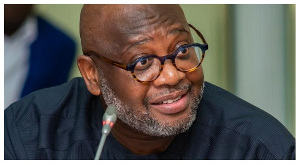May I be granted space on your network to respond to the erroneous and uninformed assertions by the National Democratic Congress (NDC) women organizer, Ms. Anita De Sosoo, to the effect that “more taxes on condoms will prevent people from engaging in rampant and irresponsible sexual behavior.” It is very alarming the way our political parties have allowed individuals without any knowledge, familiarity, or training on subjects they seek to address, to be parading themselves in the national media as spokespersons for their parties, only to be disgorging their vile propaganda to the impairment of years of research and educational campaigns that cost both human and financial resources to undertake.
HIV and AIDS research, education, and communication campaign remains specialized areas of health, where health and communication intersects, implicating professionals in medical research, public health (policy included), and communication. Being a public health issue of utmost importance in Sub-Saharan Africa, epidemiologists in public health are painstakingly tracking incidents of the disease among populations in collaboration with clinicians and laboratory researchers. Trained health communicators have the responsibility of communicating the findings of medical researchers and public health specialists to the public in ways that are accurate, reliable, and consistent with research outcomes.
Where HIV/AIDS and its related policy issues are turned into a political football, whereby individuals with no training, knowledge, or familiarity with the issues concerned are beginning to assume positions of authority and are propagating their ignorance or vile propaganda on national media networks as though their message is the gospel truth, institutions task with the responsibility of superintending research and education in these knowledge-based areas need to respond rapidly to dispel their miseducation before they undo years of educational campaigns. On this note, I call on the National AIDS Commission of Ghana, the UNDP offices in Accra, and the Ministry of Health to respond to Ms. De Sosoo’s miseducation in order to correct the erroneous impression she had tried to create to the effect that the availability of subsidized condoms on the Ghanaian market is the cause of rampant and irresponsible sexual behavior among Ghanaians.
The agonies, devastations, and deaths miseducation at the highest political levels in the area of HIV and AIDS has caused in other Sub-Saharan African countries are well documented. Even international efforts to halt the spread of HIV and AIDS can sometimes be miscalculated. In hindsight, it is obvious that the “abstinent-only until marriage” component of the US PEPFAR initiative was misconceived and was a major setback to the HIV/AIDS campaign to some extent. In Swaziland, where the Swazi King, Mswati III, decreed in 2001 that all young, unmarried Swazi women should abstain from sex for five years, over 40 percent of all Swazi adults were HIV positive in 2004 (the highest infection rate in the world at the time), three years after the decree. Similarly, in Uganda, where President Yoweri Museveni and his wife took a moral approach to dealing with the disease, evidence was already in circulation contrary to their beliefs and assertions about the disease.
In 2004, at an International conference, President Museveni said AIDS was “a moral problem caused by undisciplined sex” and for that matter condoms should be reserved for prostitutes. A position which is not too different from what Ms. De Sosoo is disseminating as the new government policy on HIV/AIDS and condoms. In the case of Museveni, his wife concluded by accusing those who promote condoms of racism. Virginity clubs were promoted among young people as an attempt to combat the disease, but evidence was already abound in that country that virginity clubs do not work. In the 1990s when HIV decline was most rapid in Uganda, the country recorded the highest teenage pregnancy rates in the world, implying if abstinence had increased among girls, pregnancy would have fallen.
The most dangerous assertion on HIV and AIDS was yet to have come from the former South African President, Thabo Mbeki, who denied any scientific links between HIV and AIDS. This denialist attitude consequently informed his policy in refusing to make antiretroviral therapies available to his countrymen who were living with the disease, causing the death of 300,000 of people living with HIV/AIDS (PLWHAs) in his country, according to a research released by Chigwedere et al. of Harvard University in 2008.
The moralization of sex, HIV and AIDS, and condoms, and the subsequent classification of sex as a luxury that should be taxed through sales of condoms is a very dangerous policy adventure with dire consequence for the fight against HIV and AIDS in Ghana. Ghana has been fortunate enough to have maintained a very low HIV infection rate, hovering around 2 percent and below through the support of about 80 percent donor fund and somewhat prudent policy initiatives over the years.
If Ms. De Sosoo assertions, as a person on the frontlines of party and government communications, are the new philosophical underpinnings of government decision to tax condoms, then Ghanaians must be prepared for some form of policy adventure with the possibility to hinder years of progress in the fight against HIV and AIDS. Is it cheaper to provide condoms at a subsidize rate or to allow the cost of condoms to be an excuse for people to indulge in unprotected sex for the state to later provide antiretroviral therapies to support them?
These are times one gets very disappointed, especially considering the fact that the opposition parties themselves who should be offering policy alternatives to the government do not seem to have a handle on some of these issues. If the moralization of sex and its taxation through condoms sales is the new policy, we only have to wait for a few years to see whether it is more expensive to provide antiretroviral drugs or to subsidize condoms.
Interestingly, the wife of the President, Lordina Mahama, is leading the country’s drive to stop new HIV infections. It makes one wonder how she can lead the crusade against the disease without effectively promoting condoms. Or, she is simply on the gravy train with those old fangled ideas of abstinence and faithfulness, when the facts on the ground are pointing to the necessity of promoting condoms among young people in any HIV/AIDS campaign. If she is, however, promoting condoms among young people, then the question is how is she able to do that in the face of her husband’s new policy initiative on condoms?
I hope donor agencies and institutions that provide funds to support HIV and AIDS initiatives in Ghana are keeping close eyes on the taxation of condoms debates and the philosophical arguments that informed government’s decision to tax condoms. But for now, if we are to go by Ms. De Sosoo’s pronouncements, we simply would classify them as misleading and counterproductive to the fight against the spread of HIV and AIDS.
In the words of Alex Coutinho of the AIDS Support Organization in Uganda, “Sexuality truly does belong to the world of magic and unreason. It is impossible to plan and control it totally. We are made that way. If sex were an entirely rational process, the species would probably have died out long ago. But the delirious, illogical nature of sex makes setting a realistic HIV prevention policy very difficult.” This assertion weakens the Theory of Reasoned Action, a theory which suggests all human actions are reasoned actions, a theory that might explain Ms. De Sosoo’s assertion, as though the sexual act is always a planned act. But evidence shows that the sexual act defies the Theory of Reason Action, as people would engage in the sexual act with or without condom.
Prosper Yao Tsikata
School of Communication Studies
Ohio University
Athens, OH
Opinions of Wednesday, 17 July 2013
Columnist: Tsikata, Prosper Yao


















